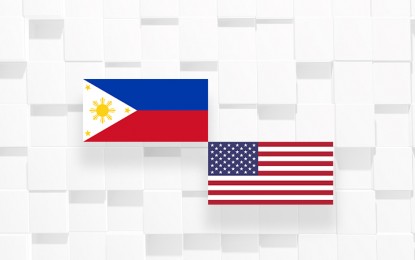From the Philippine News Agency (Jan 16, 2024): Survey: More Filipinos want PH gov't to work with US on WPS row (By Priam Nepomuceno)

MANILA – More Filipinos believe that the Marcos administration should work with the United States amid continuing tensions in the West Philippine Sea (WPS).
This is based on the results of a recent Pulse Asia survey commissioned by the international think tank Stratbase Institute which it released on Tuesday during its forum titled “Fortifying Cyber Cooperation Towards Digital Security" in Makati City.
The survey conducted from Dec. 3 to 7, 2023, asked 1,200 respondents from all over the country about their view on the countries or organizations they want the Philippines to work with considering the implications of the tensions in the WPS on the country’s security and economy.
The respondents were allowed to choose up to three answers.
Around 79 percent of the respondents said they want the Marcos administration to work with the US, while nearly half of the respondents answered Australia (43 percent) and Japan (42 percent).
Stratbase president Prof. Dindo Manhit said the results show the need for the Marcos administration to bolster its alliance and partnerships with like-minded states like the US, Australia, and Japan.
“These countries have continued to voice their support for the Philippine position and have condemned Chinese actions against Filipino vessels. Their resounding statements of support boost the confidence of the Philippines in the international community. In the face of asymmetric security challenges, the Philippines must leverage its relations with states with shared values and with the same commitment to defend the rules-based international order,” Manhit said.
He also noted that only one out of 10 Filipinos or 10 percent favored working with China.
“As evidenced by the survey results, 90 percent of Filipinos are not in favor of working with China. This is only natural, as the Philippines continue to encounter aggressive and coercive acts in the WPS. In addition to diplomatic protests, the Philippines is also exiting from China’s Belt and Road Initiative,” he said.
Results from the same survey also show that the majority or 55 percent of Filipinos believe that the Marcos administration can fulfill its promise of protecting the WPS against the illegal and aggressive actions of other states.
“As he witnessed the harassment of Chinese vessels within Philippine waters, President Marcos Jr. is aware that there are gaps to be addressed. He observed that there has been 'very little progress' and that diplomatic efforts with China are heading in a 'poor direction.' With this, he called for a 'paradigm shift' in the country’s approach. As the Philippines moves on its third year under his administration, the Filipino public will hold him accountable for turning these statements and planned approaches into actual, effective actions,” Manhit stressed.
The survey also showed that the most important reason to defend or protect the WPS is to uphold the 2016 Arbitral Tribunal ruling that affirms the country's rights to the maritime territory and promotes a rules-based international order (31 percent), to maintain our sovereign and territorial integrity (27 percent), and to protect marine resources from further destruction and prevent the abuse of such valuable resources (23 percent).
To effectively assert Philippine rights in the WPS, 67 percent of Filipinos believe that there is a need to strengthen the external defense capability of the Philippines, especially the Philippine Navy, the Philippine Air Force, and the Philippine Coast Guard through the Armed Forces of the Philippines (AFP) Modernization Program.
The majority of Filipinos also believe there is a need to reinforce the country's alliances and partnerships with like-minded countries, through the conduct of joint patrols and military exercises (56 percent), establish a stronger military presence in the WPS by repairing the BRP Sierra Madre and by conducting regular resupply missions, as well as ensuring control of the Ayungin shoal (52 percent) and improve inter-agency cooperation among agencies involved in maritime security (52 percent).
Reciprocal access pact with Japan
Department of National Defense (DND) Secretary Gilberto C. Teodoro Jr., who attended the forum, expressed hope that the Philippines' Reciprocal Access Agreement (RAA) with Japan will be signed within the first quarter of this year.
"(Hopefully the RAA will be) signed within the first quarter," Teodoro said in a chance interview with reporters.
Once signed, the RAA will provide the legal basis for the two nations to send troops to each other's territories for exercises and other related matters.
Formal negotiations on the RAA were held in Tokyo on Nov. 29 to 30, 2023, with the Philippine delegation being headed by the DND, accompanied by negotiating teams from the Department of Foreign Affairs and Department of Justice.
President Ferdinand R. Marcos Jr. and Japanese Prime Minister Fumio Kishida, during the sidelines of the 50th Commemorative Summit of the ASEAN-Japan Friendship and Cooperation in Tokyo last Dec. 17, agreed to continue coordination to reach an early conclusion of the negotiations for the RAA.
Teodoro, meanwhile, said the Philippines and Canada are working on a memorandum of understanding on defense cooperation.
"I think it's within the works, with the DFA (Department of Foreign Affairs) and with us," Teodoro said.
He added that this would possibly cover "increased defense cooperation between countries" just like the MOUs the Philippines had with other countries.
Teodoro also said the pact aims to increase "more specific exchanges" between the two nations.
https://www.pna.gov.ph/articles/1216997

No comments:
Post a Comment
Note: Only a member of this blog may post a comment.